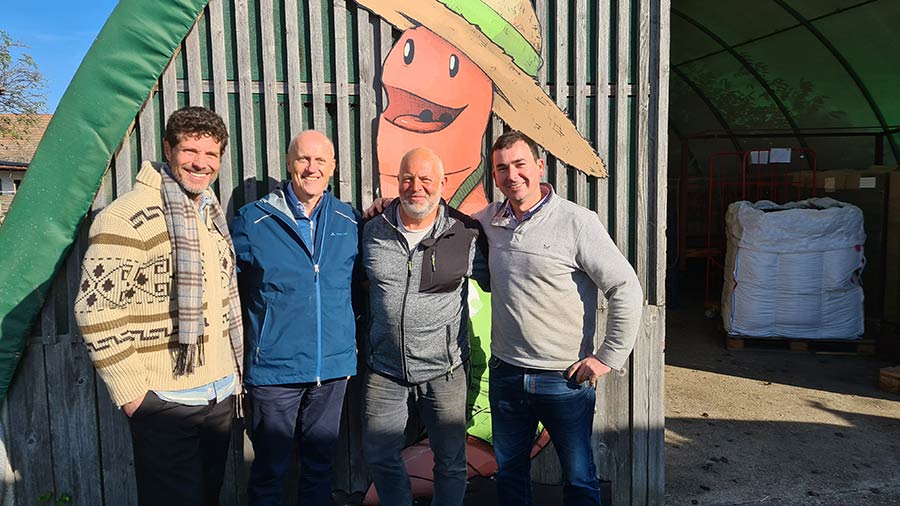The benefits of applying worm casts to soils for farmers
 From left to right: Carlos Postlethwaite, Leopold Fischer, Alfred Grand and Luke Boxall at the Worm Farm in Austria © Soil Nurture
From left to right: Carlos Postlethwaite, Leopold Fischer, Alfred Grand and Luke Boxall at the Worm Farm in Austria © Soil Nurture A group of worm farmers have formed an alliance to offer growers a nutrient-rich soil conditioner derived from high-quality worm casts to promote crop and soil health.
Earthworms play a crucial role in soils, as they decompose organic matter to release vermicasts, which are packed full of water-soluble nutrients and beneficial micro-organisms.
See also: How a hybrid regenerative system works on Bucks Monitor Farm
Boosting on-farm earthworm populations is, therefore, a key focus for many UK growers, but farmers can also benefit by directly applying worm casts to soils.
Vermicasts enhance soil structure and promote crop health, which ultimately increases yield. They are rich in nutrients, fulvic and humic acid and essential micro-organisms.
They also improve water retention, reduce risk of topsoil erosion and increase resistance to climatic stress.
The company, known as Soil Nurture, has developed a number of vermicast bio-products, which, it hopes, will reduce reliance on artificial fertilisers. They are also approved for organic use.
Austrian worm farm
The company currently sources vermicasts from a worm farm in Austria, which houses up to 5 million worms in a polytunnel composed of two worm beds.
Each bed is 2.4m wide and 50m long and contains up to 3,000 worms/sq ft.
Here, the earthworms are fed a consistent compost mix of horse manure, lucerne, hemp straw and hedge trimmings, which the worms consume and decompose in order to produce the nutrient-rich soil conditioner.
Luke Boxall, worm farmer and one of the founders of Soil Nurture explains: “Vermicast-derived products are a relatively new concept within UK agriculture and once we successfully build a strong market demand, we plan to scale up production and bring the worm-farming facility over to the UK.”
He continues that a range of vermicast products are currently available, which can be applied as solid or liquid depending on the plant’s needs and farm equipment.
“The mixes can be either applied as a foliar spray during the season, a seed drench at drilling, a soil amendment to add structure, life and nutrition or it could be used at harvest to help with the decomposition of surface trash,” he says.
Vermicast bio-products
- Bio Worm Cast The beneficial microbes and all macro and micronutrients help plants with immediate and long-term nutritional needs and improve health of the soil.
- Bio Compost A rich, high-quality, peat-free compost made from organic material. Composted at high temperatures to generate the right microbes to improve structure and add valuable nutrients and organic matter.
- Bio Carbon Soil A mixture of Bio Worm Cast, Bio Compost and Biochar.
- Bio 20/Bio 5 A premium blend of Bio Worm Cast and Bio Compost at ratios of 20:80 or 5:95 respectively.
- Bio Worm Tea A tea rich in beneficial microbes – bacteria, fungi, protozoa and nematodes that boost your plant’s health, increasing its yield and protecting against disease and pests.
Luke notes that Soil Nurture will work with farmers to ensure the optimum use product for maximum plant and soil benefit.
Benefits of worm casts
- Enhance crop germination, growth, and crop yield
- Improve crop health
- Increase resistance against diseases, pests and drought
- Rich in water-soluble nutrients and beneficial micro-organisms
- Contain plant growth and regulating hormones found only in worm castings
- Can help in reducing the need for synthetic fertilisers, fungicides and pesticides.
- Reduce risk of soil erosion and promotes soil health
- Can be applied as solid or liquid depending on the plant’s needs and your equipment
- Castings have lasting benefits over multiple seasons
Did you know?
Reducing cultivation frequency and intensity, providing an all year-round food supply and avoiding acidic or poorly draining soils are all ways to encourage earthworm populations.
Luke Boxall was speaking at the recent open day organised by the Green Farm Collective, held near Wolverhampton in the West Midlands.
